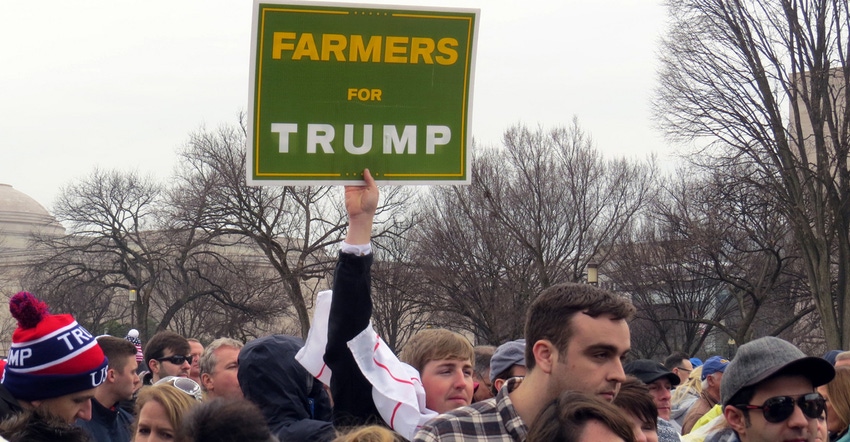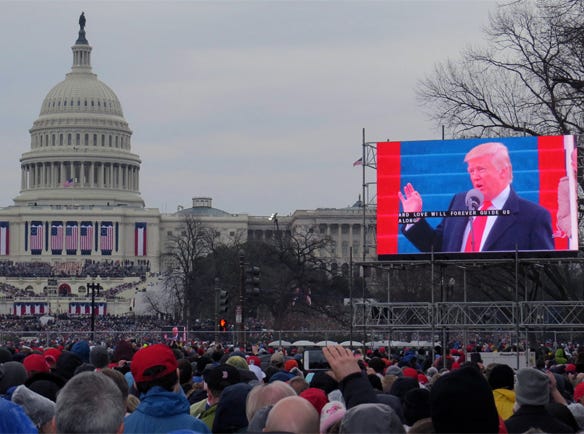February 16, 2017

Amid a sea of people under a drizzly sky, a lone sign rose like a periscope: Farmers for Trump.
Placards were not allowed at the swearing-in of our 45th president, although a few made it past security. I "pardon-me'd" my way through the crowd on the National Mall to get a closer look — and a better photo — and about halfway, there the sign holder’s arms apparently tired and the sign disappeared. I continued to nudge toward the spot where the sign once was, waited for the preinaugural ceremony music to fade and shouted, “Hey, farmers!” A cheer went up, and so did the sign. I got my shot.
Inauguration 2017 was one of patriotic, positive signs that make a farm girl at the Capitol feel proud and hopeful; and one of distasteful, negative signs, too. For the Iowa ag industry, the image of President Donald J. Trump taking the oath of office is the sign of a new era for trade, taxes and regulation.
Rural Iowa voted overwhelmingly for the Trump-Pence ticket in the November election, and while attitudes in farm country generally range from "agree" to "wait and see" on most Trump promises and policies, the issue of trade is creating some unease. One of the new president’s first executive orders withdrew the United States from the Trans-Pacific Partnership, a President Barack Obama-brokered, multilateral trade agreement which was years in the making, but had not yet been ratified by Congress.
Iowa’s trade voice
Under the new administration, Sen. Joni Ernst, R-Iowa, vowed to advocate for a stronger trade agenda on behalf of Iowans, but expressed “disappointment” in the president’s executive action to withdraw the U.S. from the TPP. “With one in five jobs in Iowa dependent on trade, access to new markets is critical to our state’s economy,” Ernst says. “However, we must not let this stop our country from pursuing increased trade opportunities for our exporters.”

NEW ERA: For agriculture, the image of President Donald J. Trump taking the oath of office is a sign of a new era for trade, taxes and regulation. But his decision to pull out of the Trans-Pacific Partnership and to renegotiate the North American Free Trade Agreement raises concern, as farmers rely on exports for a large and growing portion of their incomes.

“With the growing demand for our agricultural products across the world, it is imperative that we ensure a level playing field for American farmers and manufacturers to compete in these markets,” Ernst adds.
Sen. Charles Grassley, R-Iowa, also is working to ensure Iowans’ voices are heard in the new regime, particularly in regard to trade with China. In a recent meeting with U.S. Trade Representative nominee Robert Lighthizer, Grassley stressed that ag must be considered in all trade deals. “Trade is critically important to U.S. agriculture and to Iowa. We produce more food in this country than we can consume. I expect the new administration to work hard to maintain existing markets for Iowa and other farm states’ exports, and open new markets as well.
“Specifically, China presents a real challenge for agriculture,” Grassley continues. “On one hand, they manipulate their currency, which impacts the competitiveness of American businesses; they like to manufacture problems like the MIR 162 incident, where they temporarily rejected American dried distillers grains; and there’s the new World Trade Organization case regarding their lavish corn, wheat and rice subsidies. However, China is also one of the top export markets for U.S. ag products. With the slowdown in the ag economy, this market is critical to farmers.”
State Sen. Dan Zumbach, a Republican who heads the Iowa Senate Ag Committee, said that regardless of any single move the president has made on the trade front, he believes Trump’s business acumen will ultimately bolster agriculture and get the government working together again.
“I have faith in President Trump's business skills, and I believe this will cross over into agricultural business,” says Zumbach, a farmer from Coggon. “I am not concerned [about his trade policies] because no one knows exactly what the new trade normal will be. On a state level, I will be promoting trade policies and sharing that information with our federal representatives. I believe it is vitally important all levels of government work at rowing the boat in the same direction.”
Iowa farmer and ag advocate Annette Sweeney, who directed the Iowa Ag for Trump Coalition during the 2016 campaign, explained that while Trump’s approach is “untraditional,” she understands his strategy of studying each situation separately.
“He wants to vet the inequalities,” says Sweeney, a former Iowa representative who chaired the Iowa House Ag Committee. Sweeney and her husband, Dave, farm near Alden. “The president understands that businesses must work to make America prosper. He wants to look at each trade pact on an individual basis. Giving up our intellectual property with a trade is not good for America, and there are other parts of trade that need to be scrutinized.”
Based on her interaction with then-candidate Trump last year, Sweeney firmly believes the president will listen to the needs of Iowans in agriculture. “When I met with him, we visited about Iowa's role as a nation's leader in corn, egg, swine production and other commodities.” And, she adds, whenever Iowa farmers’ voices need to be heard, she is confident that Gov. Terry Branstad — who, upon Senate approval, will become the U.S. Ambassador to China — along with Iowa’s federal legislators, “will keep beating the drum for us.”
Less farm regulation
While not all agree with Trump trade’s moves, when it comes to reducing regulation, the new guard in Washington and the ag leaders from Iowa are on common ground. Grassley said there’s “no question” that the president and the new U.S. EPA Secretary, Scott Pruitt, support eliminating the Waters of the U.S. Rule (WOTUS).
“There are various ways to go about it, and it may be a multi-pronged approach to getting it done, either through the courts or the Administrative Procedure Act,” Grassley explains. “I joined Sen. Ernst and Congressmen David Young, Rod Blum and Steve King to send a letter to President Trump, asking him to use whatever tools his administration has to get rid of the rule. I have every confidence that ending this power grab will be a priority for the new administration.”
Ernst has joined Sen. Deb Fischer, R-Neb., to introduce a resolution that expresses the need to scrap the WOTUS rule immediately. “I have heard from farmers, manufacturers and small business owners across Iowa about the burdensome red-tape and confusion the expanded WOTUS rule creates, and the urgency for it to be scrapped,” Ernst says. “I was also able to question EPA Secretary nominee Pruitt, and was pleased to hear that he shares my grave concerns with this EPA power grab. I was proud to lead the effort to disapprove of this rule in 2015, and I look forward to working with the new administration this year to overturn this harmful rule.”
Zumbach, too, stressed that Trump needs to rescind the WOTUS rule, calling it “problematic regulatory overreach. This vague expansion of the Waters of the U.S. rule went beyond the intent of Congress, and will negatively impact Iowa farmers’ efforts to implement the nutrient reduction strategy.”
Make America great again
In Washington, D.C., on Jan. 20, my husband and I listened to the 2017 inaugural address draw to a close. The drizzle had fizzled, and the newly sworn-in president loomed large on the Jumbotrons, promising as fervently to the Americans who proudly stood with him as those who decidedly did not:
“Your courage and goodness and love will forever guide us along the way. Together, we will make America strong again. We will make America wealthy again. We will make America proud again. We will make America safe again. And yes, together, we will make America great again. God bless you. And God bless America.”
Leonard Reyman writes from Holstein.
About the Author(s)
You May Also Like




